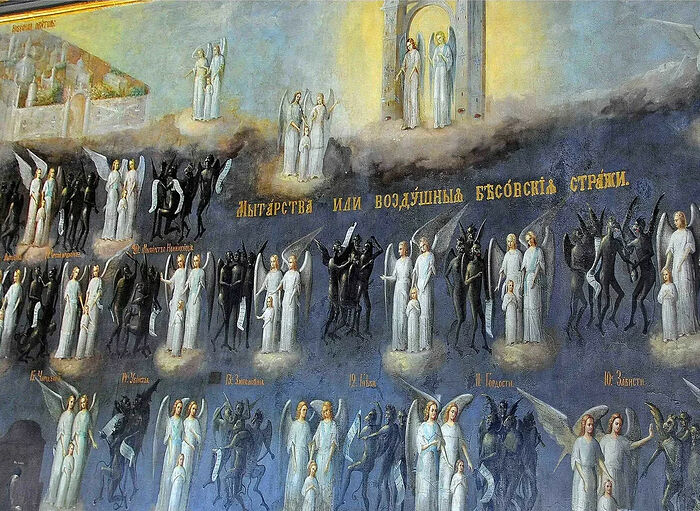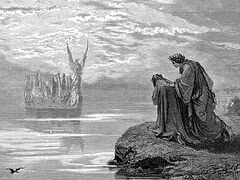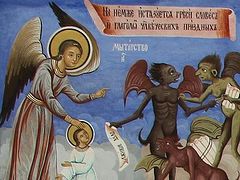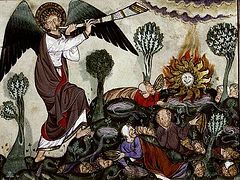 Blessed Theodora’s Journey Through the Aerial Tollhouses
Blessed Theodora’s Journey Through the Aerial Tollhouses
For in death there is no remembrance of Thee: in the grave who shall give Thee thanks?
(Ps. 6:5)
Now or tomorrow death will come...
and will in itself be imprinted on our destinies forever,
for after death there is no repentance.
St. Theophan the Recluse
Foreword
Reading descriptions of afterlife experiences, testimonies of those who passed into eternity and then by Divine Providence returned for repentance, we often see two phenomena that may at first glance seem to contradict one another. Firstly, the senses of the soul, freed from the shackles of the body, are more acute and strong—especially if the body was sick and infirm before death. Secondly, we know that after death there is no repentance, and the soul of an unrepentant sinner is bound in the state that it had just before death. Actually, the image of these “shackles” after death was given to us by the Lord Jesus Christ Himself:
And when the king came in to see the guests, he saw there a man which had not on a wedding garment: And he saith unto him, Friend, how camest thou in hither not having a wedding garment? And he was speechless. Then said the king to the servants, Bind him hand and foot, and take him away, and cast him into outer darkness, there shall be weeping and gnashing of teeth. For many are called, but few are chosen (Mt. 22:11-14).
This is how Blessed Theophylact, Archbishop of Ochrid and Bulgaria, explains this parable:
“The entrance into the wedding takes place without distinction of persons, for by grace alone we have all been called, good and bad alike; But the life thereafter of those who enter shall not be without examination, for indeed the king makes an exceedingly careful examination of those found to be sullied after entering into the faith. Let us tremble, then, when we understand that if one does not lead a pure life, faith alone benefits him not at all. For not only is he cast out of the wedding feast, but he is sent away into the fire. <…> For there are many who deceive themselves with vain hopes, thinking that they shall attain the Kingdom of Heaven, and they include themselves among the assembly of the dinner guests, thinking great things of themselves. <…> The Lord then says to His servants, the angels of punishment, Bind his hands and feet, that is, the soul’s powers of action. For in this present age is the time to act and to do, but in the age to come all of the soul’s powers of action are bound, and a man cannot then do any good thing to outweigh his sins. Gnashing of teeth is the meaningless repentance that will then take place. Many are called, for God calls many, indeed, all, but few are chosen. Few are saved and found worthy to be chosen by God. It is God’s part to call, but to become one of the chosen or not, is our part.”1
1. The senses of the soul after death
Obviously, this parable does not speak about the senses of the soul beyond the grave. We know that, according to Hieromonk Seraphim (Rose), “after death, the soul is alive, and its senses become more acute, not weakened2.”
St. Ambrose of Milan teaches:
“Since the soul continues to live after death... the soul is not held back by any obstacle placed by death, but is more active, because it is active in its own sphere without any association with the body, which is more of a burden than a benefit to it.3
The Venerable Dorotheus of Gaza says:
“For as the Fathers tell us, the souls of the dead remember everything that happened here—thoughts, words, desires—and nothing can be forgotten. But, as it says in the Psalm, In that day all their thoughts shall perish (Ps. 145:4). The thoughts he speaks of are those of this world, about houses and possessions, parents and children, and business transactions. All these things are destroyed immediately when the soul passes out of the body… But what it did against virtue or against its evil passions, it remembers, and nothing of this is lost… In fact, the soul loses nothing that it did in this world, but remembers everything at its exit from this body more clearly and distinctly once freed from the earthliness of the body.4
St. John Cassian writes that the rational powers of the soul function even better after death than during life:
“Souls after the separation from this body are not idle, do not remain without consciousness; this is proved by the Gospel parable of the rich man and Lazarus (Lk. 16:22-28)… But if you care too to understand the words spoken to the thief, Today you shall be with Me in Paradise (Lk. 23:43), what do they clearly show but that not only does their former intelligence continue with the souls, but also that in their changed condition they partake of some state which corresponds to their actions and deserts? <…> For it was not his flesh but his soul which was to enter Paradise with Christ. <…> By which He clearly shows that the souls of the dead not only do not lose their consciousness, they do not even lose their dispositions—that is, hope and fear, joy and grief... They become yet more alive and more zealously cling to the glorification of God. And truly, if we were to reason on the basis of the testimony of the Sacred Scripture concerning the nature of the soul, in the measure of our understanding, would it not be folly to suspect even in the least that the most precious part of man (that is, the soul), in which, according to the blessed Apostle, the image and likeness of God is contained (cf. 1 Cor. 11:7; Col. 3:10), after putting off this fleshy coarseness in which it finds itself in the present life, should become unconscious—that part which, containing in itself the whole power of reason, makes sensitive by its presence even the dumb and unconscious matter of the flesh? Therefore it follows, and the nature of reason itself demands, that the spirit after casting off this fleshy coarseness by which now it is weakened, should bring its mental powers into better condition, should restore them as purer and more refined, but should not be deprived of them.”5
St. Theophan the Recluse wrote to his dying sister, comforting her that death has no power over the soul: “You will not die. Your body will die, but you will go over into a different world, being alive, remembering yourself, and recognizing the whole world that surrounds you.”6
The Venerable Paisios the Hagiorite explained that “those who commit wrongdoings in this life are like drunken men. They don’t understand what they are doing; they don’t have a sense of their guilt. But when they die, this ‘drunkenness’ disappears and they become aware of their real condition. The eyes of their souls are opened and they realize their guilt, because the soul, when separated from the body, moves, sees and perceives with an inconceivable speed.”7
The fact that after leaving the body the soul feels and thinks more keenly than before is evidenced by the story of afterlife experience, written in the first person by K. Ikskul, a man who died, saw the spiritual realm and the aerial tollhouses with his own eyes, and was resurrected after praying to the Mother of God. K. Ikskul’s book, An Event Unbelievable for Many Yet True, was approved in 1910 by the outstanding spiritual writer and missionary Archbishop Nikon (Rozhdestvensky) of Vologda as containing nothing inconsistent with the Orthodox teaching about the afterlife.
Specifically, in It K. Ikskul wrote about the feelings of his soul after death: “I... suddenly felt lightness. I opened my eyes, and what I saw at that moment was imprinted in my memory with perfect clarity to the smallest detail.... Afterwards, recalling and thinking over my state of mind at that time, I only noticed that my mental abilities had functioned with amazing energy and speed...”8
To be continued…



